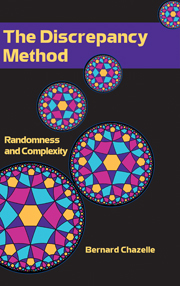Book contents
- Frontmatter
- Contents
- Preface
- 1 Combinatorial Discrepancy
- 2 Upper Bound Techniques
- 3 Lower Bound Techniques
- 4 Sampling
- 5 Geometric Searching
- 6 Complexity Lower Bounds
- 7 Convex Hulls and Voronoi Diagrams
- 8 Linear Programming and Extensions
- 9 Pseudorandomness
- 10 Communication Complexity
- 11 Minimum Spanning Trees
- A Probability Theory
- B Harmonic Analysis
- C Convex Geometry
- Bibliography
- Index
10 - Communication Complexity
Published online by Cambridge University Press: 05 October 2013
- Frontmatter
- Contents
- Preface
- 1 Combinatorial Discrepancy
- 2 Upper Bound Techniques
- 3 Lower Bound Techniques
- 4 Sampling
- 5 Geometric Searching
- 6 Complexity Lower Bounds
- 7 Convex Hulls and Voronoi Diagrams
- 8 Linear Programming and Extensions
- 9 Pseudorandomness
- 10 Communication Complexity
- 11 Minimum Spanning Trees
- A Probability Theory
- B Harmonic Analysis
- C Convex Geometry
- Bibliography
- Index
Summary
In the last two decades, communication complexity has emerged as an important methodology in the study of computational complexity. As opposed to, say, information theory, which seeks to model and analyze real-life problems, communication complexity is an abstraction aimed at isolating the computational bottlenecks of certain problems and providing tools for resolving their complexity. The discrepancy method has played—directly or indirectly—a pivotal role in the development of that theory.
We provide two examples, one very simple, the other less so. Both illustrate the underlying theme of this chapter: Low discrepancy implies high complexity. Informally, what happens is this. Two people play a game by taking turns. Each player has some distribution associated with him/her, which evolves over time at each move. As long as the players keep the two distributions “similar” enough, they can continue playing. This is a dynamic version of a discrepancy game, where a lower bound on the number of rounds depends on the players' collective ability to maintain low discrepancy as long as possible. Paradoxically, this phenomenon is the opposite of the one described in Chapter 6, where high discrepancy implied high complexity.
If all of this talk sounds a little surrealistic, the two examples treated in this chapter will surely clarify matters. In §10.1, we discuss the communication complexity of the inner product function. In §§10.2–10.4 we devise a communication complexity game and use it as a vehicle for deriving lower bounds for searching in a bounded universe.
- Type
- Chapter
- Information
- The Discrepancy MethodRandomness and Complexity, pp. 346 - 375Publisher: Cambridge University PressPrint publication year: 2000



